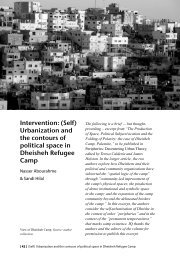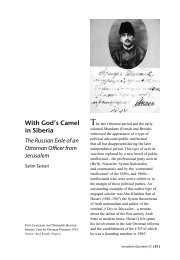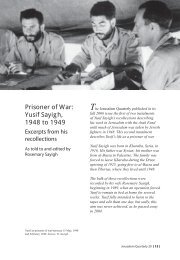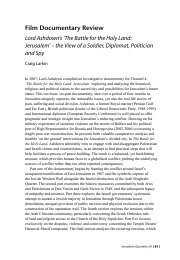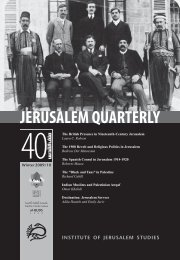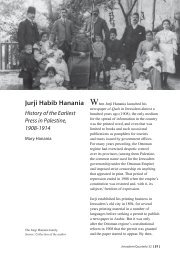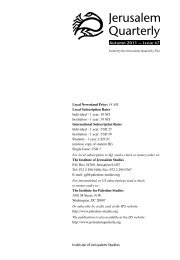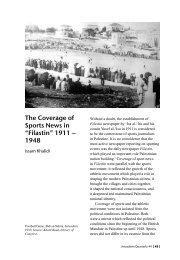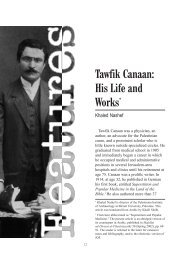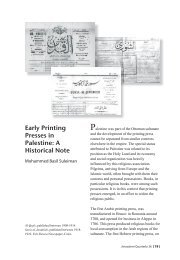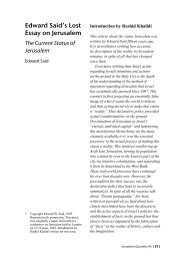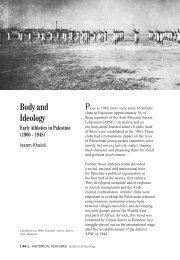PLUNDERING PALESTINE - Jerusalem Quarterly
PLUNDERING PALESTINE - Jerusalem Quarterly
PLUNDERING PALESTINE - Jerusalem Quarterly
Create successful ePaper yourself
Turn your PDF publications into a flip-book with our unique Google optimized e-Paper software.
The National Library and Orientalisation<br />
The book looting cannot be understood without first tracking the history of the<br />
National Library. Since the establishment of the Hebrew University in 1925, the<br />
National Library had been intended to serve both as an archive for Israeli and Jewish<br />
culture over the years, and – in the words of Chaim Nahman Bialik who spoke at the<br />
university’s groundbreaking ceremony – to serve as a place whose windows are “open<br />
to the four winds… to bring to it all that is good and sublime from the fruits of man’s<br />
creative mind in all times and in all countries.” 18 This attitude is what allowed Arab<br />
texts, including scripture, literature, science, and foreign language books, to become<br />
integrated in the National Library, namely to become part of ‘our’ knowledge of the<br />
East. In short, discussion of this book affair cannot be complete without returning to<br />
Edward Said, who taught us that the Orient (like the Occident) is not a fixed fact of<br />
nature – they are both the creation of man. Said would probably have claimed that<br />
the books were orientalised not only because they were discovered as ‘oriental’, but<br />
also and mainly because it was possible to force them into becoming ‘oriental’. He<br />
also would have reminded us that this book affair is related to that enormous chain<br />
of power relations and interests, supervision and control, that decides who should be<br />
allowed to talk (represent the Orient), and who will remain silent, voiceless, devoid of<br />
the opportunity to represent himself.<br />
The role played by the Eastern Department of the National Library in the looting of<br />
Palestinian books expressed two of its functions. On the one hand, it was home to<br />
celebrated Orientalists, Zionist intellectuals who were educated at Middle Eastern<br />
studies departments in Britain and Germany (Dr. David Bennett, Prof. Guthold Weill,<br />
etc.), scholars who were not only librarians, but also central figures at the Oriental<br />
Studies Institute in Hebrew University and for whom the collection of these books<br />
was part of a wider task of mapping and understanding the East. On the other hand,<br />
the department accommodated Arab librarians 19 as well as librarians from eastern<br />
countries (mainly from Iraq) in the daily work of collecting and cataloguing the books.<br />
Their work once more reveals to us how the eastern Jews, themselves the object of the<br />
Israeli and Ashkenazi establishment’s orientalism, have become major players in the<br />
oppression of the Arabs. 20<br />
In Love with Plunder<br />
Strauss’ memo is also notable for its quick adjustment to the new situation, including<br />
a daring leap towards the creation of the ‘obvious’, where the books are not ours,<br />
but yet are already entirely ours, only months after the process of their collection<br />
began. A similar process was occurring not far from the National Library in the new<br />
government offices, as Benny Morris delineates in his book about the creation of<br />
[ 16 ] FEATURES Ownerless Objects?



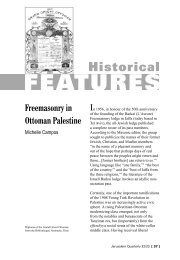
![In Search of Jerusalem Airport [pdf] - Jerusalem Quarterly](https://img.yumpu.com/49007736/1/180x260/in-search-of-jerusalem-airport-pdf-jerusalem-quarterly.jpg?quality=85)
